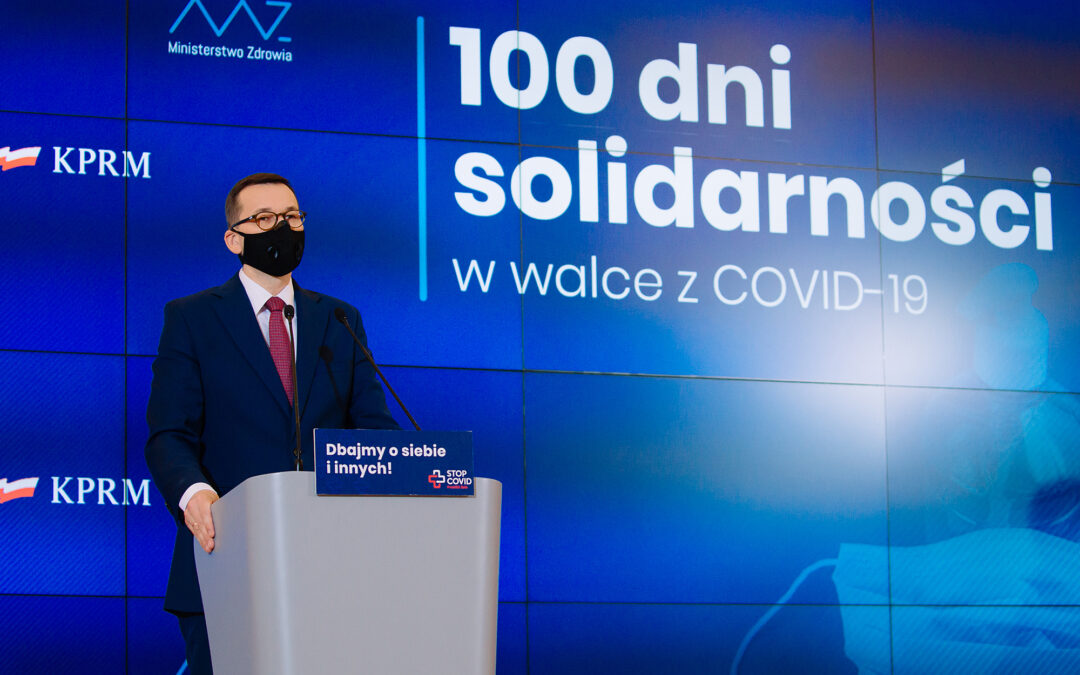The government has announced that establishments currently closed under coronavirus restrictions – including schools, restaurants and gyms – will remain so until after Christmas.
Schools will effectively not reopen until mid-January, as winter holidays have been moved forward. Shopping centres will, however, reopen next weekend.
Announcing the measures this morning, Prime Minister Mateusz Morawiecki called for Poles to show “100 days of solidarity that will allow us to better get through this period”. By the end of that time, a vaccine should have started to be available, he said.
Morawiecki noted that daily case numbers have recently fallen from their peak and stabilised at around 20-22,000 per day. “But the situation is still very serious,” he warned. “We have to demand more of ourselves. Poles have powerful weapons at their disposal: discipline and compliance.”
Although the number of new infections has dropped from its peak, death rates have continued to rise, reaching their highest-ever level. The last four days have seen the four highest daily figures for Covid-related deaths: 603, 637, 626, 574 respectively.
Schools stay shut
The prime minister announced that all schools would remain closed until 23 December, which is the last day before the Christmas break. Additionally, the annual two-week winter school holiday (known as ferie in Polish) will be moved forward to start on 4 January for all pupils.
That means that children will not return to schools until 18 January at the earliest – by which time the first coronavirus vaccine doses should be available, said Morawiecki.
Ferie normally take place at different times in various parts of the country between mid-January and the end of February. But the prime minister said that moving the holiday to a single earlier time, and families staying at home rather than going away, should help to “break the chain of infections”.
Morawiecki also urged people not to plan trips abroad or large family gatherings with relatives from across the country over Christmas and the new year. “We are working on legal options that will limit the possibility of movement,” including domestically, he noted.
The government has also pledged to provide financial support to the winter tourism industry to compensate for the loss of earnings.
“[Christmas] is a time of hope, but this holiday is also a test – and how we pass this test will determine how many of us survive this difficult time,” said Jarosław Gowin, the deputy prime minister, speaking alongside Morawiecki.
Secondary school pupils have already been learning online since 17 October. They were joined later that month by Years 4 to 8 from primary schools. On 9 November, primary schools were closed completely, with the three youngest year groups also moving to remote learning.
Restaurants, gyms and cultural institutions also stay closed
All catering establishments – including restaurants, cafes, pubs and clubs – will remain closed to in-person customers until at least 27 December. So will fitness centres – including gyms and pools – and cultural institutions such as theatres and cinemas. This maintains the restrictions put in place in October and earlier this month.
Other previously existing measures also remain in place, including limits on numbers at religious services and in public transport, as well as bans on organising weddings and trade fairs. Hotels can still only accept business guests or medical workers, while spectators are not allowed to attend sporting events.
Morawiecki says that the period from now until 27 December is the “accountability stage”. If the country comes through that successfully, it can then enter the “stabilisation stage”, when the government will reintroduce a colour-coded division of districts into categories with varying levels of restrictions based on local infection rates.
However, if the national infection rate starts to rise again, and goes above a seven-day average of 27,000 new cases per day, then the country will have to enter “national quarantine”, with even tougher restrictions in place than at present.
Progi etapów zasad bezpieczeństwa ⬇️ pic.twitter.com/teygbcDbDe
— Kancelaria Premiera (@PremierRP) November 21, 2020
Shopping centres to reopen
From next Saturday, 28 November, shopping centres will be allowed to reopen, the prime minister announced today. They have been closed since 7 November, apart from stores deemed essential.
Morawiecki emphasised, however, that the reopening will be conditional on strict compliance with “a new sanitary regime”. He warned that any stores found not to be following the rules – which will include limits on customer numbers as well as use of disinfectant or gloves – “will be closed”.
The government may also decide to relax its Sunday trading ban by allowing shops to open on all three Sundays before Christmas instead of the currently permitted two, said Gowin, who also serves as minister for development and labour.
Main image credit: Krystian Maj/KPRM (under CC BY-NC-ND 2.0

Daniel Tilles is editor-in-chief of Notes from Poland. He has written on Polish affairs for a wide range of publications, including Foreign Policy, POLITICO Europe, EUobserver and Dziennik Gazeta Prawna.




















